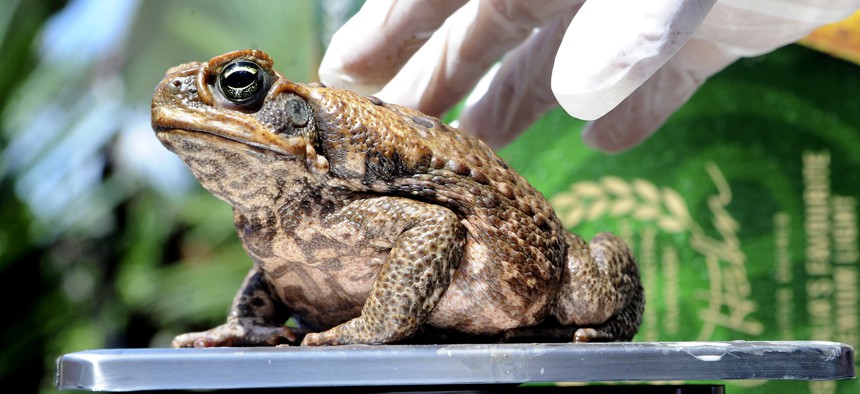The Tiny Poisonous Toads Taking Over Florida Yards

This March 29, 2009 file photo shows a cane toad being weighed at a collection point in Cairns, Australia during the "Toad's Day Out" program. AP Photo/Brian Cassey
“It was like a mass exodus of toads.”
The cane-toad invasion of Palm Beach Gardens, Florida, began, according to one resident, with a few toads in her pool last Thursday. “We weren’t sure what they were, so we removed them,” she told The Palm Beach Post. “Friday morning, it was like a mass exodus of toads. Baby toads.”
In photographs, tiny amphibian bodies swarmed a swimming pool, clambered up walls, and carpeted a hallway—countless toads so numerous and overwhelming that the residents of Palm Beach Gardens needed to call in help.
OUTBREAK OF TOADS An bizarre infestation is leaving a Palm Beach Gardens community concerned @HughesWPTV https://t.co/bo4064yxdO pic.twitter.com/4RYY4rHhxe
— WPTV (@WPTV) March 20, 2019
In the spring, with toad-breeding season under way, Jeannine Tilford starts getting calls to her pest-removal company, Toad Busters. Cane toads, also known as bufo toads, are yet another invasive species that has found a hospitable home in balmy southern Florida. Deliberately introduced from South and Central America in the 1930s, they were supposed to control beetles damaging the sugarcane crop—that’s how they got the name “cane toads.” Escaped pets likely helped establish the current population. When we talked on Tuesday morning, Tilford was getting ready to catch toads in the overrun Palm Beach Gardens neighborhood later that night.
The specific problem, she diagnosed, was an undisturbed lake in the neighborhood. With nothing to bother the toad eggs and tadpoles, nearly all of them had metamorphosed into toads, suddenly hopping en masse into yards and pools.
Cane toads can pose a particular danger because the adult ones shoot toxin from their back when attacked. The tiny, just-metamorphosed toads don’t carry enough toxin to be deadly yet, but big adult ones can easily send a dog into a seizure or even kill it. The toxin is “very viscous and would stick inside the dog’s mouth,” says Steve Johnson, a wildlife ecologist at the University of Florida. Owners should try to wipe out an affected dog’s mouth and immediately take it to the vet.
(Nevertheless, there are reports of brave or foolhardy dogs licking cane toads to get a brief high. Multiple cane-toad experts told me, sternly, that this is not recommended for humans.)
Tilford started Toad Busters in 2017 to supplement her income as a high-school science teacher. Her most memorable job was on a property near Miami. The woman who lived there had nine cats, which she fed by dumping almost a bag of cat food every night. Cane toads normally eat bugs, but they are happy to eat pet food, too. The toads were so fat, Tilford said, “they couldn’t even jump.” She ended up catching more than 130 by hand.
Tilford takes some of the toads she removes to her toad dealer, because, it turns out, there is a demand for the creatures. The toads can end up in research labs, on biology-class dissection tables, or as pets in Europe, where it’s generally too cold for the toads to survive in the wild. The rest, about 30 percent, she estimates, have to be humanely euthanized according to American Veterinary Medical Association guidelines—first anesthetized with a benzocaine spray and then put in a freezer. (Here are step-by-step instructions, for anyone looking to deal with cane toads on their own.) “I really hate killing anything,” Tilford said, “but it’s illegal to release them because all I’ll be doing is spreading more of the invasive species.”
Cane toads have adapted beautifully to the Florida suburbs, so a lot of Tilford’s work also involves getting people to rethink their suburban backyard. No more cat food, for example. Pet poop can also attract insects, which can in turn attract toads. As do lights. And toads love to breed in ornamental pools of water, such as the lake in the affected Palm Beach Garden neighborhood. For “these larger communities that want to build these beautiful ponds and want to have houses on ponds,”Tilford said, “this is almost a pest-control service.” The cane toads aren’t going away, but they can be managed like mosquitoes or rats.
Dealing with toads amounts to a nuisance in Florida, but they can also create more dramatic problems. In Australia—where they were also deliberately introduced in the 1930s to protect sugarcane—they are a genuine scourge.
The issue is that Australia has no native toad species, so none of the predators knew to avoid the toxic toads. As the cane toads advanced east to west across the continent, “they left a wake of dead animals in their paths,” says Sean Doody, an ecologist at the University of South Florida at St. Petersburg who has studied cane toads in Australia. Turtles, lizards, and crocodiles just started dying out, which was good news for their prey. “If you were a small species that was previously being eaten, suddenly you’re on a honeymoon,” says Rick Shine, a biologist at Macquarie University in Sydney, Australia, who has also studied the impact of cane toads on Australian wildlife.
The ecological impact isn’t quite so dramatic in Florida, which has plenty of native toads. (As Shine puts it, “Cane toads are just bigger and uglier than local toads.”) They simply have to be dealt with: Last night, Toad Busters’ three-person crew spent three hours picking up hundreds of baby toads in Palm Beach Gardens. Tilford has also noticed native species, such as green tree frogs, starting to come back to areas where she’s removed cane toads. And the humans, of course, are happier too.
Sarah Zhang is a staff writer at The Atlantic, which originally published this article.
NEXT STORY: Measles Crackdown: County Begins Ban of Unvaccinated Children from Public Places





